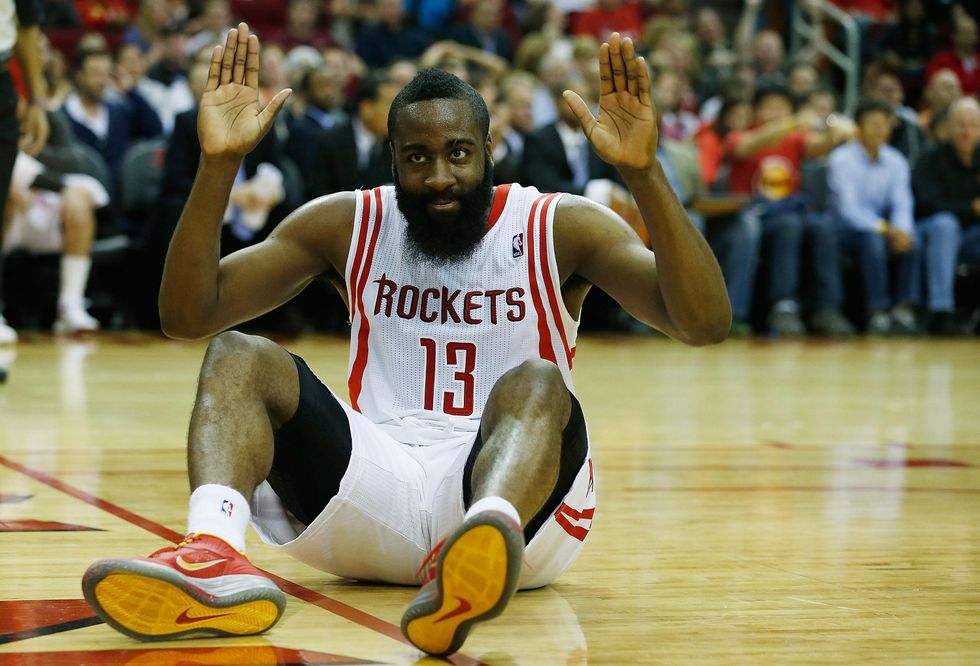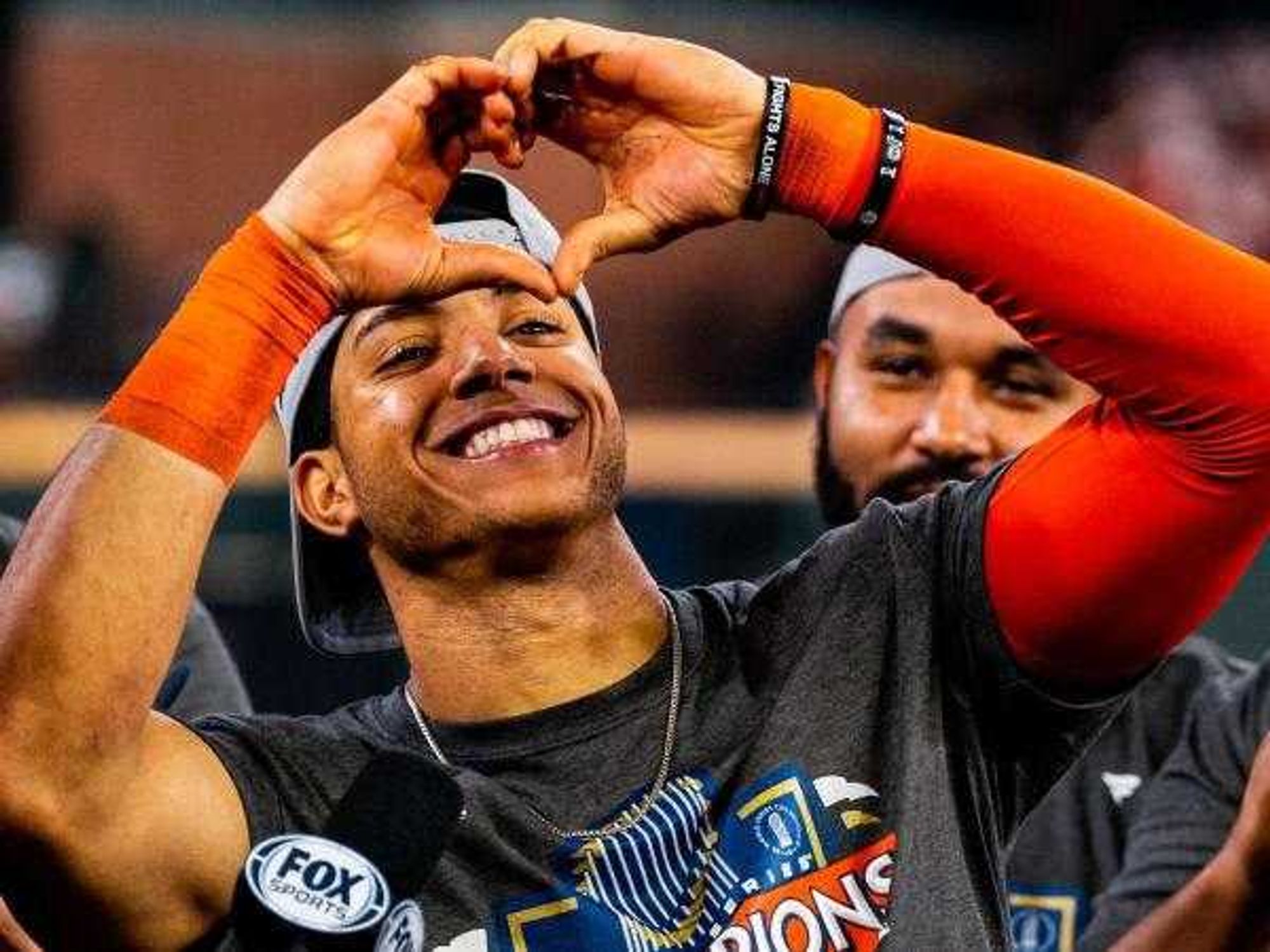Kobe's Houston Whine
Stop crying Kobe Bryant: Your prime is long gone, James Harden's clearly the new No. 1
When Dwight Howard offered the assessment during the Houston Rockets media day that teammate James Harden has the opportunity to become "the best two guard in the league," the declaration came across as the sort of compliment players transitioning from one franchise to another make in deferring to the reigning star on their new team, a public gesture acknowledging the unquestioned leading man as to avoid presumptions pressed upon the newcomer that he is the hired hand saddled with burdens and expectations of leading the franchise to the promised land.
But for those who witnessed firsthand the transformation Harden made from third wheel in Oklahoma City to main attraction in Houston, what Howard uttered amounted to confirmation. Additional validation followed this week when NBA.com released the results of its annual poll of league general managers, with front office personnel naming Harden as the best shooting guard in the NBA.
Kobe Bryant remains a highly skilled and irrepressibly motivated player, but his prime is past.
It marked the first time in a dozen years of voting that Los Angeles Lakers guard Kobe Bryant failed to earn that distinction, a development that inspired some discussion.
Bryant, with his indefatigable work ethic, five championship rings, and ongoing pursuit of the all-time career scoring mark, has cultivated a loyal following among not only Angelenos but basketball fans throughout the globe. A sociopathic commitment to excellence and an unrepentant willingness to scorn those lacking his unflinching focus and unbreakable will has positioned Bryant among the most revered professional athletes in the history of international competition.
With that standing comes a healthy dose of myopia, as Lakers fans frequently cast aside all logic to substantiate claims that Bryant is comparable to Michael Jordan when, in truth, LeBron James presents a sounder statistical argument when debating the top performers of recent generations.
When Harden was named the best two guard in the league, the response was predictable. The polling results were summarily dismissed, with Lakers fans rambling into the ether about titles and counting stats and intangibles that reflect an inherent bias as opposed to an adherence to statistical study. In truth, Harden played Bryant to a statistical draw last season and, given the fact that he is just 24 years old and that Bryant, at 35, has yet to be cleared to return from offseason Achilles' tendon surgery, it doesn't require extensive effort to justify the GM's collective vote.
With regard to frequently parroted rate stats, Bryant possessed slight edges by averaging 27.3 points, 5.6 rebounds and 6.0 assists last season compared to Harden, who averaged 25.9 points, 4.9 rebounds and 5.8 assists. Bryant, whose reputation as a shooter remains overinflated, made 46.3 percent of his field goal attempts, his best percentage since he shot 46.7 percent in 2008-09 and the sixth-highest mark of his brilliant 17-season career. Harden, delving fully into volume scoring as a first-time starter, shot 43.8 percent overall but managed modest gains over Bryant in 3-point shooting percentage (36.8 to 32.4 percent) and free-throw shooting percentage (85.1 to 83.9 percent). The disparity in 3-point shooting dovetails into the analysis of advanced statistics.
Bryant and Harden posted nearly identical effective field goal percentages, with Harden shooting 50.45 percent while Bryant shot 50.41 percent. Bryant posted the highest assist rate of his career (29.7 percent) while producing his lowest usage rate (31.9 percent) in five seasons. Harden trailed Bryant in assist rate (a career-high 25.7 percent) and rebound rate (7.9 to 7.2 percent) while boosting his usage rate nearly eight points to 29.0 percent, an expected bump considering the significant change of roles following his emancipation from the Oklahoma City bench.
The hair-splitting continued in Player Efficiency Rating (both Bryant and Harden finished at 23.0) while Harden held the advantage in win shares (12.8 to 10.9), win shares per 48 minutes (.206 to .174) and offensive rating (116 to 112). In defensive rating, Harden outpaced Bryant 107 to 106. Essentially, Bryant and Harden yielded identical production for their respective teams.
That returns the argument to age and health. Bryant has been in decline defensively for years, posting 2.6 defensive win shares last season after averaging 3.7 between 2005-11. His PER was his second-lowest since his Age 22 2000-01 season, excluding his injury-marred 2011-12 campaign. Bryant remains a highly skilled and irrepressibly motivated player, but his prime is past. The additional uncertainty surrounding a return from the most catastrophic injury of his career lends credence to the decision to supplant Bryant with Harden atop the heap of NBA two guards.
James Harden's Rise
Conversely, Harden is ascendant. His workload increased exponentially via his growth into a high-usage performer, with his minutes played bumped by 1,000 while his field goal and free throw attempts doubled from his final season with the Thunder. After garnering NBA Sixth Man of the Year honors in 2011-12, Harden took to the limelight better than anyone could have anticipated, showcasing an offensive repertoire so diverse and complete that he earned All-NBA Third Team accolades. Bryant, buoyed by reputation, earned First-Team All-NBA honors.
I f Harden can fulfill his vast potential, he would be the Rockets' first brilliant backcourt player since Calvin Murphy.
The only other two guard among the six guards recognized was Miami Heat star Dwyane Wade, who shared Third Team honors alongside Harden. In the GM's poll, Wade finished behind Harden, Bryant and a trio of players who curiously aren't shooting guards: Stephen Curry (Golden State Warriors), Kevin Durant (Oklahoma City Thunder) and Paul George (Indiana Pacers).
What should entice Rockets fans is the fact that Harden appears on an upward trajectory. For a franchise renowned for its "Legacy of Bigs" from Elvin Hayes to Moses Malone, Ralph Sampson and Hakeem Olajuwon to Yao Ming and, presumably, Howard, the Rockets' history is devoid of transcendent two guards. Clyde Drexler arrived from the Portland Trailblazers on Feb. 14, 1995 and subsequently helped Olajuwon secure a second consecutive NBA title, but by that point his prime had been exhausted through his marvelous, Hall of Fame run in Rip City.
The Rockets have had their share of solid, role-playing two guards, but aside from swingman Tracy McGrady, none could claim extraordinary talent. As for McGrady, he was acquired from the Orlando Magic on June 29, 2004 in his prime and in possession of consecutive NBA scoring titles, but a series of debilitating injuries and ceaseless melodrama undermined his potential. Harden can't match McGrady in terms of explosive athleticism, but he does showcase similar scoring acumen and creativity as a passer.
If Harden can fulfill his vast potential, he would not only help Rockets fans erase from memory the disappointment of the fractured Yao-McGrady era, Harden would provide the franchise its first brilliant backcourt player since Calvin Murphy.
Last season marked the first step toward realizing that promise. In seven preseason games, Harden finished with a remarkable shooting slash line of .513/.514/.829. That sample size comes with caution, but Harden appears comfortable with stardom.
That NBA general managers recognize his talents legitimizes the Rockets' machinations to secure him.

